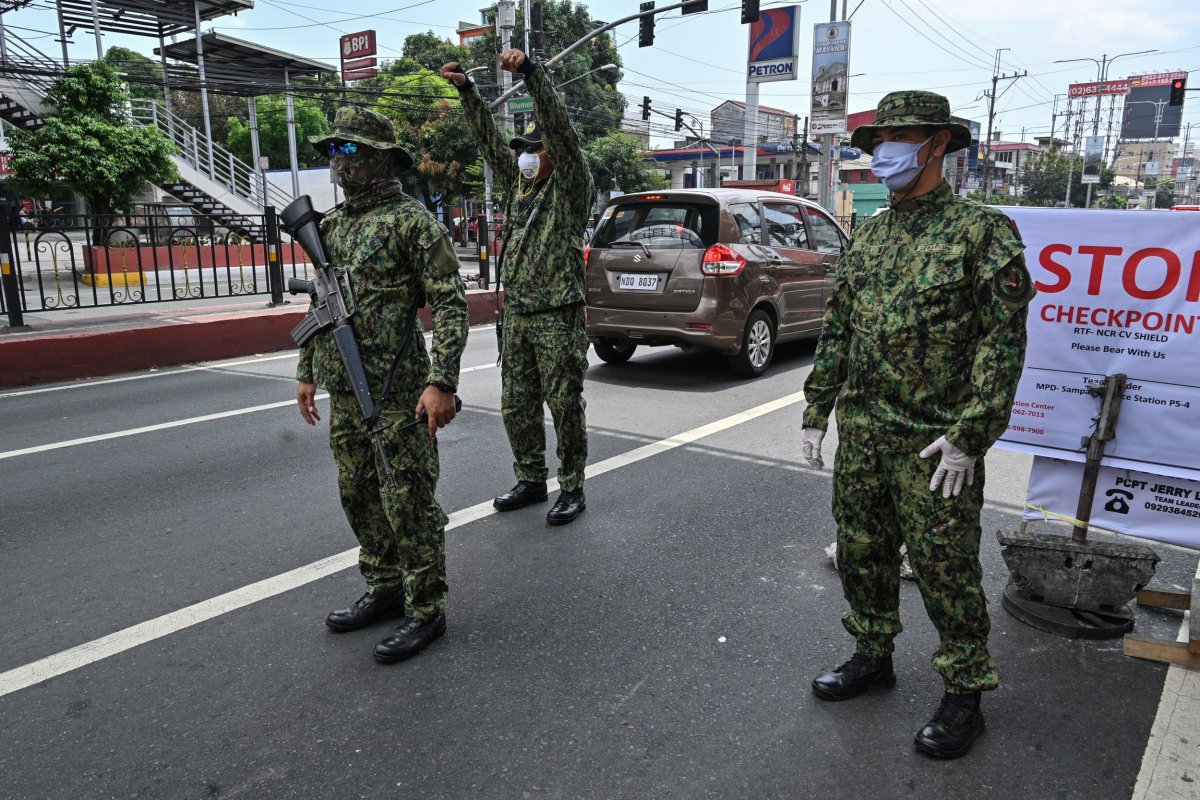Philippines President Rodrigo Duterte has warned that anyone breaking the coronavirus lockdown on the island of Luzon may be shot by the military or the police, as the country fights to contain the spread of the novel coronavirus.
The controversial president — who has been accused of crimes against humanity over his merciless and bloody war on drugs — gave a televised address on Wednesday warning there would be a zero tolerance policy for those breaking the lockdown, which came into force on March 15 and will run until at least April 14.
There have been 2,311 confirmed cases in the Philippines, with 96 deaths and 50 recoveries. The country's health care system could be overwhelmed if the spread gets out of control, but hundreds of new cases are now being reported daily.
Duterte told citizens Wednesday that the situation is "getting worse," Reuters reported. "So once again I'm telling you the seriousness of the problem and that you must listen. My orders to the police and military... If there is trouble and there's an occasion that they fight back and your lives are in danger, shoot them dead."
"Is that understood?" he added. "Dead. Instead of causing trouble, I will bury you."
Duterte's threats came after reports of unrest in Quezon City, a low income part of the capital Manila, where residents were protesting over the lack of government food aid. At least 21 people were arrested, according to CNN Philippines.
Duterte also warned that abuse or discrimination against medical workers, driven by the stigma of their exposure to COVID-19, was unacceptable and would not be tolerated.
The national police chief said Thursday that officers did not take Duterte's threat literally and said no one would be shot for violating the lockdown, Reuters reported.
The president is known for his aggressive and offensive remarks, particularly with regards to law and order. His drug war has killed between 5,552 and 6,660 people since June 2016, according to official figures. But human rights groups put the figure far higher — at least 27,000 by the middle of 2019.
World Health Organization advice for avoiding spread of coronavirus disease (COVID-19)
Hygiene advice
- Clean hands frequently with soap and water, or alcohol-based hand rub.
- Wash hands after coughing or sneezing; when caring for the sick; before, during and after food preparation; before eating; after using the toilet; when hands are visibly dirty; and after handling animals or waste.
- Maintain at least 1 meter (3 feet) distance from anyone who is coughing or sneezing.
- Avoid touching your hands, nose and mouth. Do not spit in public.
- Cover your mouth and nose with a tissue or bent elbow when coughing or sneezing. Discard the tissue immediately and clean your hands.
Medical advice
- Avoid close contact with others if you have any symptoms.
- Stay at home if you feel unwell, even with mild symptoms such as headache and runny nose, to avoid potential spread of the disease to medical facilities and other people.
- If you develop serious symptoms (fever, cough, difficulty breathing) seek medical care early and contact local health authorities in advance.
- Note any recent contact with others and travel details to provide to authorities who can trace and prevent spread of the disease.
- Stay up to date on COVID-19 developments issued by health authorities and follow their guidance.
Mask and glove usage
- Healthy individuals only need to wear a mask if taking care of a sick person.
- Wear a mask if you are coughing or sneezing.
- Masks are effective when used in combination with frequent hand cleaning.
- Do not touch the mask while wearing it. Clean hands if you touch the mask.
- Learn how to properly put on, remove and dispose of masks. Clean hands after disposing of the mask.
- Do not reuse single-use masks.
- Regularly washing bare hands is more effective against catching COVID-19 than wearing rubber gloves.
- The COVID-19 virus can still be picked up on rubber gloves and transmitted by touching your face.

Uncommon Knowledge
Newsweek is committed to challenging conventional wisdom and finding connections in the search for common ground.
Newsweek is committed to challenging conventional wisdom and finding connections in the search for common ground.
About the writer
David Brennan is Newsweek's Diplomatic Correspondent covering world politics and conflicts from London with a focus on NATO, the European ... Read more
To read how Newsweek uses AI as a newsroom tool, Click here.








